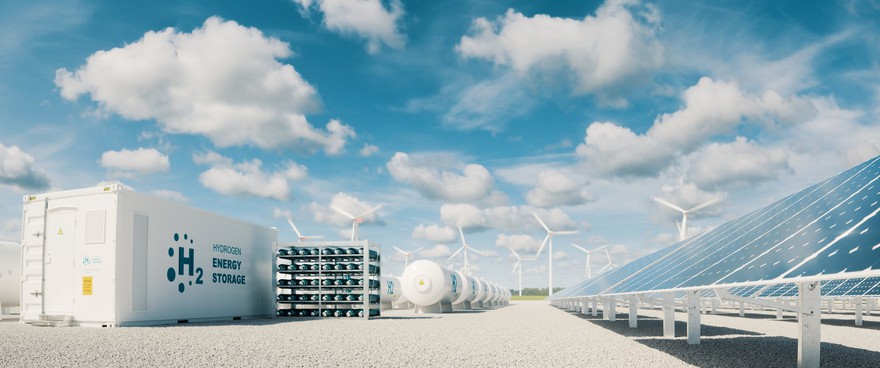Natural gas is an abundant resource. It's also cleaner and cheaper than other fossil fuels, such as oil and coal.
However, natural gas has a significant disadvantage. Gas must travel from production basins to market centers by pipeline. Since it's not easy to build pipelines across oceans, that puts many international markets out of reach. Companies must turn natural gas into a pressurized liquid and transport it using specialized ships that can carry it to overseas markets.

Energy companies are investing billions of dollars in building liquefaction facilities in hopes of cashing in on the growing international demand for liquefied natural gas (LNG). Here's a look at what's ahead for the sector and the companies in the best position to cash in on the growing global LNG demand.
An overview of the LNG market
Global LNG trade reached 407 million metric tons (MT) in 2024, according to industry leader Shell (SHEL +1.13%). That's a 2 MT rise from 2023, the lowest increase in a decade, due to constrained new supplies.
Shell expects global LNG demand to rise more than 60% by 2040. Fueling that forecast is economic growth in Asia, emissions reduction in heavy industry and transport, and the rise of artificial intelligence (AI).
Several companies are investing to meet future needs. They are exploring for more natural gas resources and also developing LNG export and import infrastructure. The investments could pay big dividends for LNG-focused companies, provided the demand grows as expected and pricing stays attractive.
Law of Supply and Demand
What are the top LNG companies?
Many of the world's largest LNG producers are state-controlled companies. Qatargas, owned by the government of Qatar, is one of the world's largest LNG producers. Qatar was the world's top LNG producer until 2023, when the U.S. overtook the Middle Eastern nation as the LNG leader for the first time in history.
Although state-owned companies are a force in the LNG market, they're not alone. Several publicly traded energy companies rank among the LNG sector's biggest producers. Here are five top LNG stocks for investors to consider:
| Name and ticker | Market cap | Dividend yield | Industry |
|---|---|---|---|
| ConocoPhillips (NYSE:COP) | $121.3 billion | 3.24% | Oil, Gas and Consumable Fuels |
| Cheniere Energy (NYSE:LNG) | $44.5 billion | 0.99% | Oil, Gas and Consumable Fuels |
| ExxonMobil (NYSE:XOM) | $547.8 billion | 3.08% | Oil, Gas and Consumable Fuels |
| Shell Plc (NYSE:SHEL) | $211.0 billion | 3.86% | Oil, Gas and Consumable Fuels |
| TotalEnergies (NYSE:TTE) | N/A | N/A | Oil, Gas and Consumable Fuels |
1. Cheniere Energy

NYSE: LNG
Key Data Points
In 2016, Cheniere Energy (LNG +1.95%) became the first company to export LNG from the lower 48 states. It has invested more than $50 billion to become the leading U.S. LNG producer and the second-largest global producer. The company operates two LNG facilities along the U.S. Gulf Coast that export gas to foreign buyers:
- Sabine Pass: Located in Louisiana, the LNG facility has six fully operational liquefaction units, or "trains." Sabine Pass has the capacity to produce about 30 million metric tons per annum (MTPA) of LNG. The company has started the permitting process to potentially expand that facility by another 20 MTPA. It hopes to approve its next expansion phase by 2026.
- Corpus Christi: This Texas facility currently has three LNG trains with the capacity to produce roughly 18 MTPA of LNG. Cheniere is actively expanding this facility. It was wrapping up construction on the Corpus Christi Stage 3 project in 2025. It also approved the Corpus Christi Midscale Trains 8 & 9 and Debottlenecking Project in mid-2025, which will add another 5 MTPA.
Cheniere Energy sells roughly 90% of its LNG to foreign buyers, such as utilities, under long-term, fixed-fee contracts. The company's contracted volumes provide it with a predictable cash flow. It uses the money to repay debt, invest in expanding operations (e.g., Corpus Christi Midscale Trains 8 & 9), and reward shareholders through dividends and share repurchases.
Cheniere plans to deploy more than $25 billion of its available cash towards accretive growth, share repurchases, balance sheet management, and dividends through 2030. That supports its aim to generate more than $25 per share of distributable cash flow by the early 2030s.
2. ConocoPhillips

NYSE: COP
Key Data Points
ConocoPhillips (COP -0.75%) is becoming a major player in the global LNG market. The U.S. oil and gas giant owns interests in LNG production facilities in Australia, Qatar, and Equatorial Guinea.
The company is actively expanding its global LNG portfolio. It has a 30% interest in Port Arthur LNG, which should start up in 2027. It's also an investor in two new LNG expansions in Qatar (North Field South and North Field East). Additionally, the company has signed LNG purchase agreements for projects on the U.S. Gulf Coast and the west coast of Mexico. It has also signed regasification agreements in Europe and sales contracts in Asia.
ConocoPhillips' investments in LNG will help fuel considerable free cash flow growth through the end of the decade.
3. ExxonMobil

NYSE: XOM
Key Data Points
ExxonMobil (XOM +0.59%) is a global leader in LNG. The oil and gas giant owns interests in several LNG projects across the world that produce 23 million tons per year. Notable investments include ownership interests in Gorgon LNG, PNG in Papua New Guinea, and several LNG trains in Qatar.
LNG is one of ExxonMobil’s four areas of strategic investment focus. The company is investing in several projects, aiming to grow its global capacity to 27 MTPA. One notable investment is the more than $10 billion Golden Pass LNG project in the U.S. The joint venture with QatarEnergy will have the capacity to export about 18 million tons of LNG per year starting by the end of 2025.
ExxonMobil is also working with QatarEnergy, Shell, ConocoPhillips, TotalEnergies, and others to expand the North Field in Qatar. The two-phase expansion will feature six LNG trains that will grow the capacity from 77 MTPA to 126 MTPA by 2027. The first phase will cost an estimated $30 billion. Meanwhile, in late 2025, the company's partner in Australia's Gorgon project, Chevron (CVX +0.06%), approved the $2 billion Gorgon Stage 3 project.
These investments will enable the oil giant to achieve its bold goal of roughly doubling the size of its LNG business to around 40 million tons per year by 2030.
4. Shell

NYSE: SHEL
Key Data Points
Shell (SHEL +1.13%) was an early pioneer in the LNG market and has grown into a dominant force over the years. The company has LNG supply projects in 10 nations representing around 40 million tons of capacity. It also has interests in a couple of regasification plants that turn LNG back into gas so it can flow through local pipeline systems.
Shell operates an integrated gas business. It controls supply by producing gas from a variety of fields. The company also operates LNG export facilities and markets LNG -- from its own facilities and those operated by third parties -- to customers around the world. The combination enables Shell to keep costs low to maximize the value of the LNG it produces.
Shell is actively expanding its leading global LNG business. It aims to add as many as 12 million tons of capacity by the end of the decade. It has projects underway in Canada, Qatar, Nigeria, and the UAE. Shell is also a partner with Exxon and Chevron in the Gorgon project. Once complete, they'll help extend the company's dominance in the global LNG market.
5. TotalEnergies

NYSE: TTE
Key Data Points
TotalEnergies (TTE +0.88%) has made LNG a priority in recent years. The French energy giant's focus is on investing in renewable energy, electricity, and natural gas. It aims to have gas -- natural gas, hydrogen, and biogas -- supply 50% of its energy mix by 2030.
TotalEnergies has acquired and developed several LNG projects in recent years. The investments pushed it up the global rankings for production capacity. Combined with its third-party supply agreements, it was the world's third-largest LNG player in late 2025.
TotalEnergies expects to continue expanding its LNG empire in the coming years. It also joined forces with GIP and NextDecade (NEXT +4.13%) to participate in the Rio Grande LNG project in the U.S., which will grow its capacity in the country from 12 MTPA to more than 15 MTPA by 2030. It also took a 16.6% stake in the Energia Costa Azul LNG project in Mexico. Additionally, the company plans to resume development of a massive $20 billion LNG project in Mozambique.
Benefits and risks of investing in liquefied natural gas stocks
Investing in LNG stocks has its pros and cons. Some of the benefits include:
- Growth potential: Demand for LNG is on pace to grow 60% by 2040.
- Dividend income: LNG facilities tend to generate stable cash flow backed by long-term contracts. As a result, many LNG producers pay high-yielding and steadily rising dividends.
- Lower carbon: LNG is a much lower-carbon fuel compared to coal and oil.
Meanwhile, some of the risks of investing in these stocks include:
- Overinvestment: Several companies are either building or have proposed to build new LNG export terminals around the world. If the industry builds too many facilities, it could cause LNG supplies to outpace demand, weighing on pricing and investment returns in the sector.
- Commodity prices: LNG prices can be volatile. That can reduce the cash flows of LNG production not secured by long-term, fixed-rate contracts. It can also cause companies to delay LNG expansion projects.
- Cost overruns: LNG projects are costly to build, risking cost overruns that can reduce returns.
How to Invest in Liquefied Natural Gas Stocks
Anyone can invest in LNG stocks. Here's a step-by-step guide on how to add them to your portfolio:
- Open your brokerage app: Log in to your brokerage account where you handle your investments.
- Search for the stock: Enter the ticker or company name into the search bar to bring up the stock's trading page.
- Decide how many shares to buy: Consider your investment goals and how much of your portfolio you want to allocate to this stock.
- Select order type: Choose between a market order to buy at the current price or a limit order to specify the maximum price you're willing to pay.
- Submit your order: Confirm the details and submit your buy order.
- Review your purchase: Check your portfolio to ensure your order was filled as expected and adjust your investment strategy accordingly
Related investing topics
LNG has a bright future
The world's economies will need an increasing supply of cleaner fuel in the decades ahead to help combat climate change. Due to its abundance and lower carbon emissions compared to other fossil fuels when burned, natural gas appears poised to provide a significant portion of that supply. LNG gives it the global access needed to reach key markets.
LNG demand is growing due to the rising global need for the cleaner-burning sources of energy. That fuels the belief that LNG stocks could do exceptionally well in the coming years as companies benefit from global demand.











